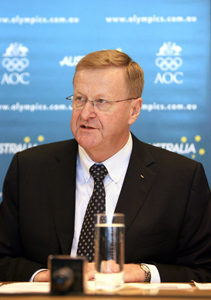AUSTRALIA'S 10 YEAR DECLINE IN OLYMPIC MEDAL TALLY
 October 27: Australia has slipped to seventh on the gold and overall medal tally according to the latest benchmark study conducted by the Australian Olympic Committee (AOC).
October 27: Australia has slipped to seventh on the gold and overall medal tally according to the latest benchmark study conducted by the Australian Olympic Committee (AOC).
The 2009 survey shows Australia with a total of 38 medals, 9 gold, 15 silver and 14 bronze, the first time in well over a decade Australia's medal count has fallen below 40.
The study shows Australia is trailing USA with 90 medals, Russia 70, China 68, Germany 60 and France 44. Australia is level with Great Britain on 38 but GB has 11 gold, 14 silver and 13 bronze to rank ahead of us.
Australia won 41 medals at the Atlanta Games in 1996, 58 medals at the Sydney Games, 49 in Athens and 46 at the 2008 Beijing Olympics.
"History shows we have a drop off in the immediate years after an Olympic Games, it happened after Atlanta, Sydney and Athens, and then we recover. But the study highlights a steady decline in the number of medals won over the past decade and that is a major concern" said AOC President John Coates.
"Since winning the 58 medals in 2000 we have hovered in the mid to high 40's for close on ten years, suddenly we are down in the 30's. It is a significant drop."
The previous low occurred in 1997 with a benchmark performance of 37 medals compared to the peak of 60 medals in 1999 including 20 gold.
In 2000 and 2004 Australia finished fourth on the overall medal tally but five years later finds itself trailing Germany, France and Great Britain, with Italy closing the gap behind in 8th place overall with 34 medals including 11 gold, two more than Australia.
"It is no fluke the countries investing money in their athletes, Germany, France, Great Britain and Italy are either ahead of us or not far behind. While we might be level with Great Britain at this stage in the four year cycle I expect them to peak at their home Games. We jumped from 41 medals in Atlanta to 58 in Sydney. Team GB won 47 in Beijing and I would expect them to similarly improve to over 60 in London in 2012," Coates said.
For years Swimming has been the foundation of Australia's medal success but in 2009 they recorded a dramatic fall with just 13 medals, including only two gold, in the pool and open water events.
Since 2000 Swimming has consistently won between 15 and 18 medals - only dipping below 15 medals once in 2006 and reaching a high of 20 medals at the Beijing Games.
"Maybe the swimsuits were a factor, only time will tell" Coates said.
Despite the drop off in medals Coates says there are some positive signs for the Australian Olympic Team.
"There has been some great performances in athletics, cycling is going through a rebuilding phase and the signs for them are very positive for London," Coates said.
"Men's hockey is in very capable hands with Ric Charlesworth and their benchmark event is yet to come. Our Women's hockey squad is now back beating the top nations and most pleasing of all, are the recent results in Gymnastics. The people in Gymnastics have worked so hard for so long, congratulations to them on the three medals at the recent World Championships."
Coates has again set the Australian Team a goal of finishing in the top five nations on the overall medal tally at the London Games which he believes will require 55 medals.
"We are a long way off our goal of 55 medals at this point but the athletes, the coaches, the medical staff and management of all the sports are giving 100 percent and we have some outstanding young athletes coming through the ranks. It is way too early to start writing us off just yet subject, of course, to David Crawford recommending or the Government providing the necessary funding to our athletes," Coates said.
(The benchmark study is conducted on World Championship, World Cup and equivalent events. It is based on 2009 results; it is not a prediction for London 2012)